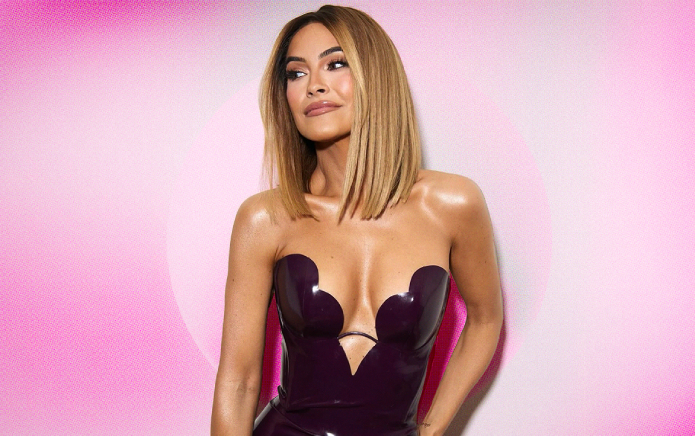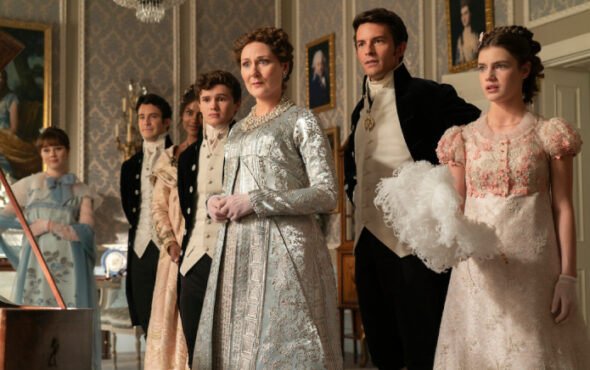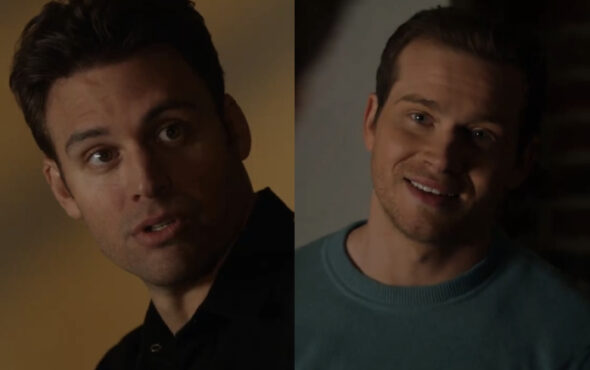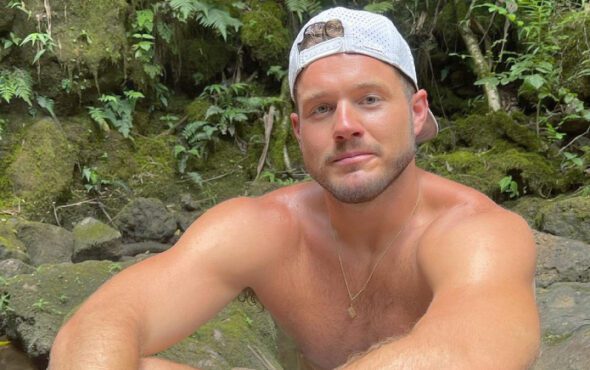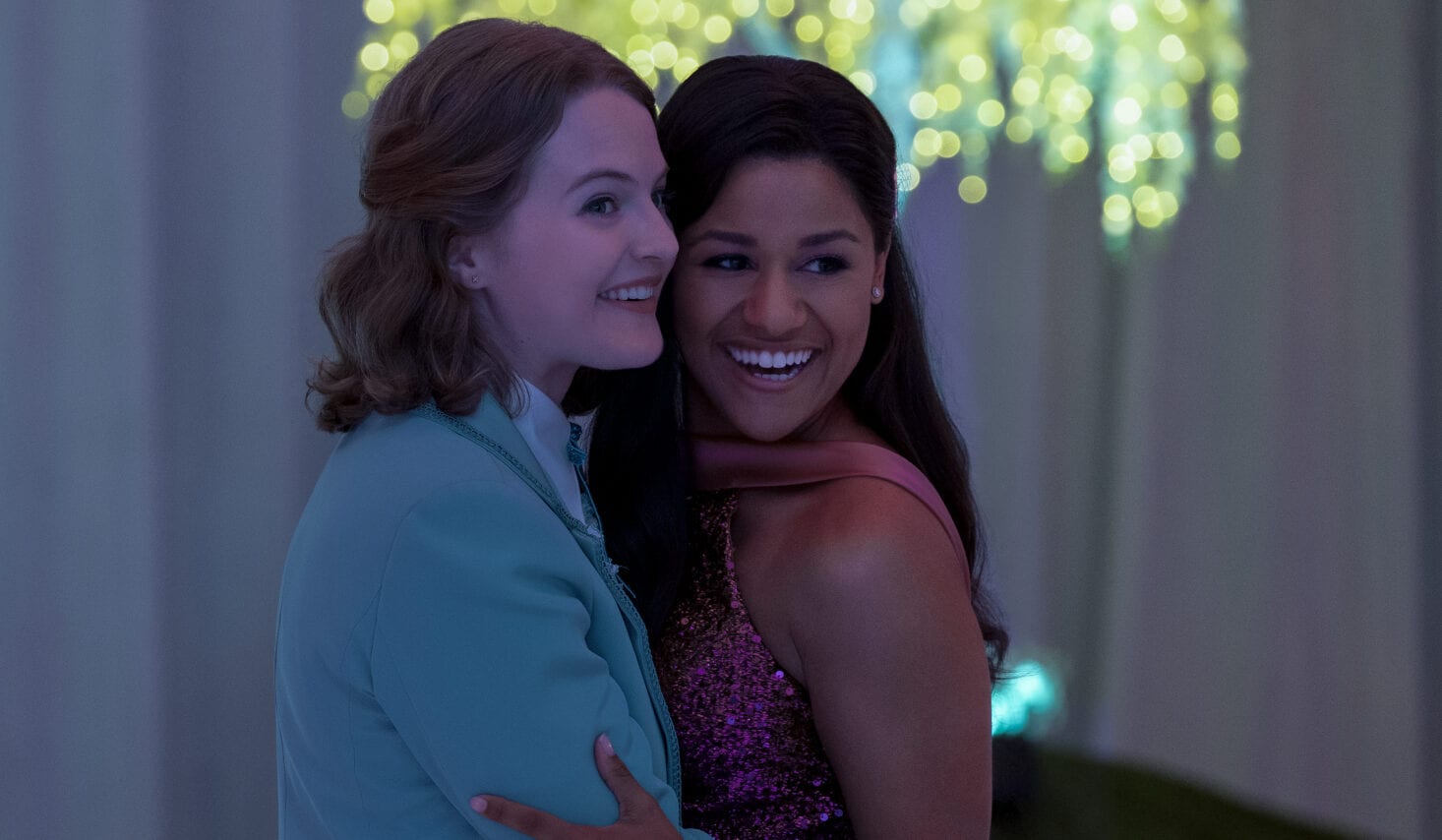
After nine years of slaying the stage in various Broadway productions such as Bring It On, Hamilton and Summer: The Donna Summer Musical – the latter of which earned her a Tony nomination – Ariana DeBose has made the transition to film (in a Ryan Murphy production no less). In Netflix’s long-awaited adaptation of The Prom, Ariana succeeds Anna Grace Barlow and Isabelle McCalla as Alyssa Greene, a high school senior and closeted lesbian who has to grapple with her mother’s anti-LGBTQ+ views. It boasts an ensemble cast including Meryl Streep, Nicole Kidman, Andrew Rannells, Kerry Washington, Keegan-Michael Key, James Corden and newcomer Jo Ellen Pellman as her love interest.
For Ariana, Alyssa’s story is one that she could relate to. Speaking to GAY TIMES over Zoom, the star says the musical – which we rated four out of five stars – is a “redo” of her own personal prom experience, where she “backed” away from dancing with a girl due to the traditional response from her classmates. “Instead of having people look at me in judgement when I was dancing with a girl, I got to experience what it felt like to have people cheer for you, and to normalise it,” she opens up. “There’s nothing wrong! There’s nothing wrong for dancing with who you want to dance with.”
As a queer Black woman who failed to see herself represented on screen in her youth, Ariana doesn’t take her role lightly. As well as providing a much-needed depiction of a teenage lesbian of colour, she hopes the film will usher in a future where LGBTQ+ people don’t have to come out. “I wanna live in a world where humans are humans, and you don’t have to make a grand declaration about your sexual preference or gender identity,” she explains. “That’s the world I want to live in.” Here, we chat with Ariana about her role in The Prom, which premieres 11 December on Netflix. Warning: mild spoilers ahead.
The Prom brought me so much joy and it feels like it couldn’t have come a better time.
Right? It’s literally perfectly timed for the year that we’ve all had. It’s a great celebration and I think that’s what the world needs. We need to celebrate our humanity, be reminded of all the possibility that we still hold, and that ultimately, love does conquer all – no matter what form it comes in. I think that’s really powerful; acceptance, celebration, all that good stuff.
I haven’t cried happy tears like that in a minute.
[Laughs] I know! Just boohoo-ing and smiling at the same time!
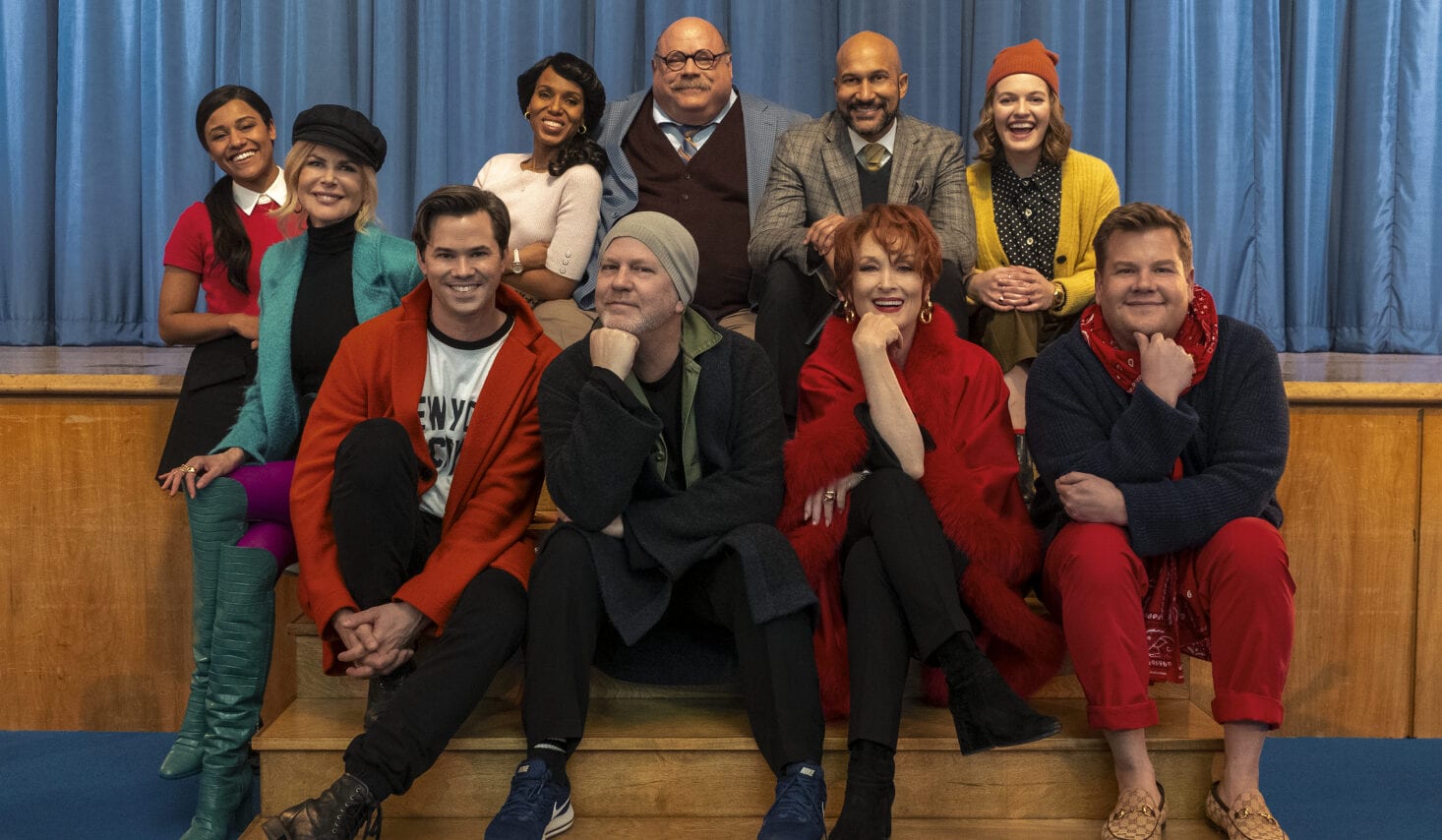
It’s also one of the gayest things I’ve ever seen in my life?
Sparkles, honey. Sparkles everywhere. It was a sparkle explosion!
How did you get involved with the film and what drew you to Alyssa?
I saw the Broadway show three times and I loved it. Oh my gosh, I just love what that original cast did with these characters, specifically Isabelle McCalla, who identifies on the LGBTQ+ spectrum and is a woman of colour. Immediately, I looked right at her, and I was so proud of what she was doing. I was proud to feel myself represented on a Broadway stage because it’s very rare that queer stories about women of colour get told, quite frankly. So when I heard that Ryan Murphy had the rights to make this into a film, I remember saying to the universe, ‘I’d love an opportunity to be a part of that.’ I can’t even remember the last time I saw a teenage coming out story about a young Black woman, I really can’t. I feel like we’ve done a great job with normalising and making coming out stories more accessible about white boys – even Black boys. But we have yet to see a normalisation around young queer Brown girls.
For you personally, what does it mean to tell this story to audiences?
I was really honoured and proud to get the opportunity to bring Alyssa to life. She’s spunky and smart, and she’s trying to wear so many hats. She wants to do a good job and please everyone and make her mother proud, but at the end of everything, she has to make herself proud. She has to be proud of herself in order to meet her mother halfway. Representation matters. I am not an actor who holds the belief that if you don’t identify as the character, you shouldn’t play it. I don’t necessarily think that is true, but I think in certain circumstances, like The Prom, the fact that Jo Ellen and I both identify as LGBTQ+ only enhances the depth and the chemistry between the characters. When you can have an authentic connection between two people on camera, it goes above and beyond helping the story land. I think you really fall in love with these girls because there’s an element of the two of us as individuals, understanding what it means to be queer and come out in today’s world. It’s really powerful and palpable and I believe people will feel that.
It’s the first major motion picture for you and Jo Ellen Pellman. What was it like to work with her on this film?
I had actually made West Side Story prior to making The Prom. But this is the first film that is being given to the world that I’m a part of. Working with Jo Ellen on this film… Watch out world: Jo Ellen Pellman is a force. I’m enamoured with the human that she is. She’s got such a big heart and she’s so charming that you can’t help but fall in love with her face. We were real partners in this journey and I was so honoured to be able to hold her hand and support her in whatever way I could. And vice versa, she was always there for me when I needed to vent or figure something out. It’s always good to have someone to bounce ideas off of. I cannot say enough positive things about the craftsman that Jo Ellen Pellman is.
And her vocals are stunning.
Gorgeous! I love her.
What would it have meant to you, as a queer youth, seeing two lesbians in a musical performing a song such as I Wanna Dance With You?
It would have meant a lot, I’ll be frank. My personal prom story, I went with my best friend, his name is Jonathan. He’s a straight white male. We were dancing and this girl that I had a crush on came and asked me to dance. Jonathan said, ‘Go ahead, go do it!’ He encouraged me because he knew I was questioning at the time, and so I did. While I was dancing with her, I noticed that people had started to stare, and not in a positive way. I got really self-conscious, and I remember being very flushed, so I backed away from her. I couldn’t say anything because I felt really ashamed, number one, that I was reacting that way. But, I couldn’t help myself. When I think about I Wanna Dance With You and then the version in the inclusive prom setting, it’s like… If I had this film, that moment would’ve been very different. That’s also why I’m so grateful for my experience on this film because I got a redo. Instead of having people look at me in judgement when I was dancing with a girl, I got to experience what it felt like to have people cheer for you, and to normalise it. There’s nothing wrong! There’s nothing wrong for dancing with who you want to dance with. There’s nothing wrong with dancing with a girl. And there’s nothing wrong with two men dancing or two trans identifying humans dancing together. It should not matter.
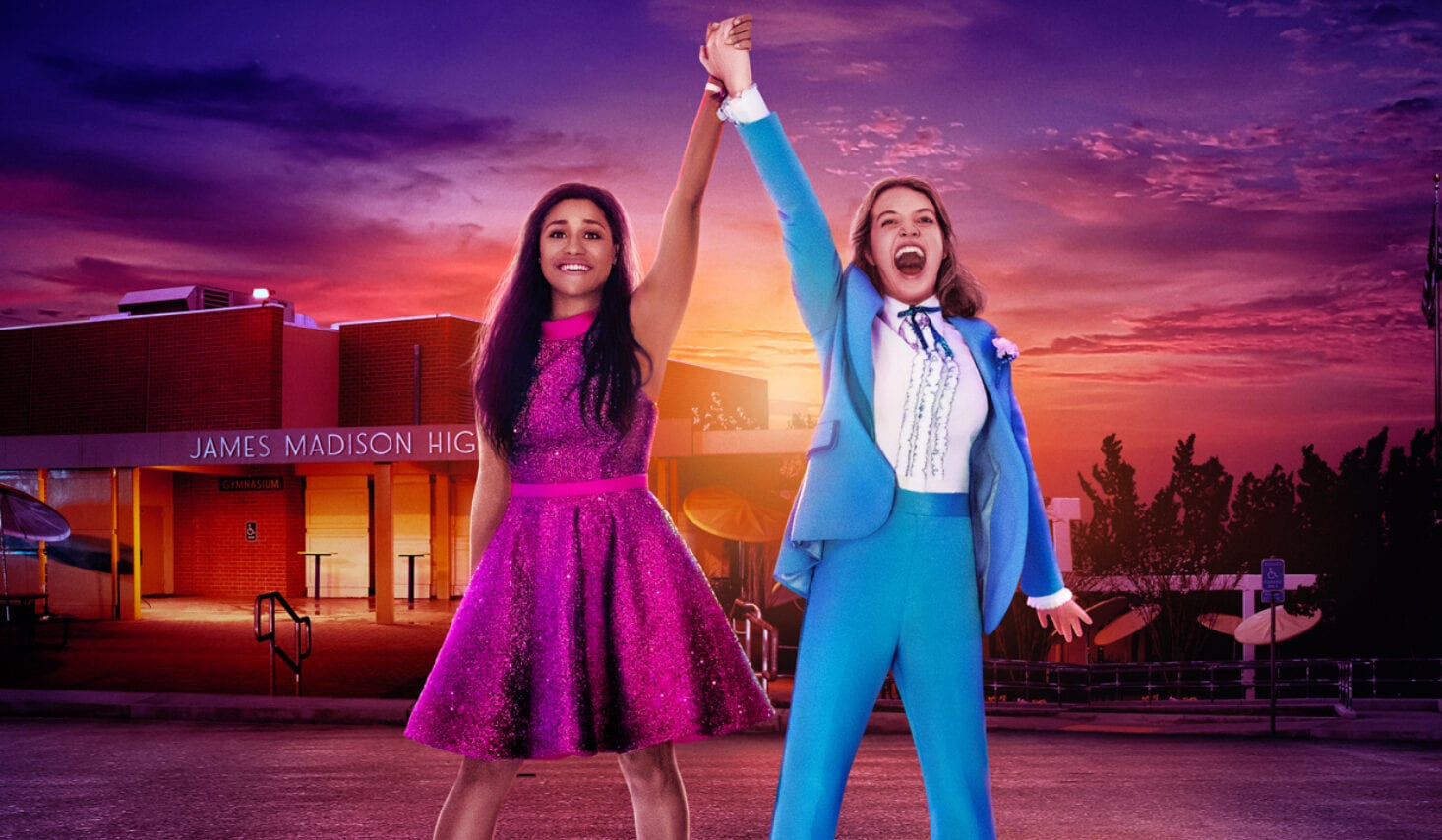
Did you personally encounter any difficulties, because you share quite a similar experience with Alyssa?
That entire sequence with the first prom, within the film, it was hard to play. I can relate to trying to find the courage, right? You’re watching Alyssa struggle to find the courage because it’s scary. It’s scary to tell the people you love most in the world who you are. It’s actually one of the bravest things I believe humans can do and it’s one of the most vulnerable things that humans can do; to truly stand in your power, be who you are and risk being seen as you are. I can definitely identify with that.
How does it feel, knowing that your portrayal of Alyssa is going to inspire so many queer people to do exactly that?
I won’t lie to you, it’s a little scary! I’m grateful that Netflix championed this film and green-lit this because they have such a global platform. You’re right, that means so many people around the world will get to see this film. I don’t take the responsibility lightly. I’ve already started receiving messages from young people, just saying they’ve seen the pictures from the film and they’re like, ‘Oh my gosh, you look like me, and you’re queer, playing a queer character. This is new. This gives me hope.’ That means a lot to me. Like I said earlier, if I had access to a film like this, maybe my journey into standing in my power would’ve been slightly different. I will say though, my mother was so wonderful. I was 11-years-old when I looked at her and was like, ‘I think I could like girls too.’ She said, ‘Oh! Well that’s nice. Carry on.’
Now that is a great response.
Honestly! And I think that’s maybe the real answer to your previous question. I hope this film does give people hope and that it does help young people believe in a happy ending. I hope The Prom inspires young people to stand in their most authentic power, and ushers in a time where we don’t necessarily have to come out anymore. I wanna live in a world where humans are humans, and you don’t have to make a grand declaration about your sexual preference or gender identity. That’s the world I want to live in.
It feels amazing that we’re in a time where we can have this conversation. For so long, the world has been adamant about categorising and labelling LGBTQ+ people, but it feels like we’re moving towards a future where we don’t need labels, and we can just be who we are.
You make a great point. I identify as LGBTQ+ and specifically as ‘queer’, that is the word that I have chosen. I have gone on record way back in the day, before anybody really knew me, saying that I don’t really enjoy labels, from my personal experience. But I also believe in the power of labels because I believe in defining yourself. Whatever you need to define yourself, that is well and good and I say, ‘You go Glen Coco!’ What I’m not here for is having society define me. That is my right. In addition, I believe in the spectrum. I believe in rainbow spectrum grace, and I believe in making room for all of that. I’m here for the journey and I think that we will continue to evolve. Perhaps we’ll see more letters added to our current alphabet, who knows? But I do think that the grand experiment of life is made more rich by this process of self-discovery.
The Prom premieres 11 December on Netflix – watch the trailer here or below.
